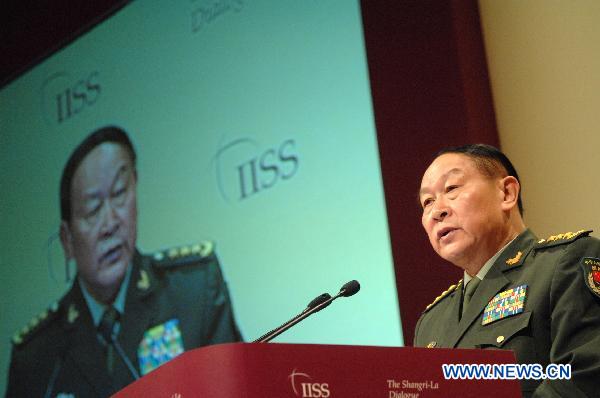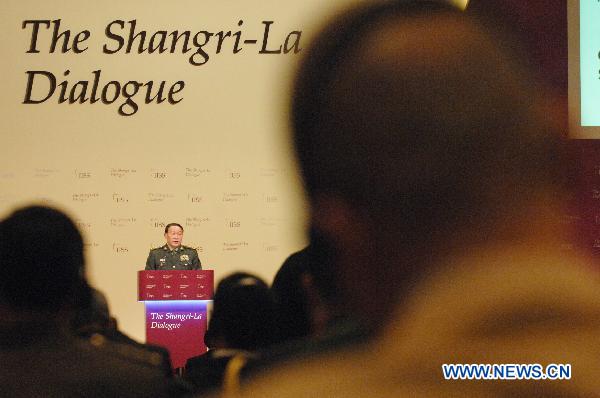Government and Policy
China has defense talk mechanism with 22 countries
(Xinhua)
Updated: 2011-06-05 17:23
 |
Large Medium Small |
|
 Chinese State Councillor and Chinese Defense Minister Liang Guanglie gives a speech during the fourth plenary session of the 10th International Institute for Strategic Studies (IISS) Asian Security Summit: Shangri-La Dialogue in Singapore, on June 5, 2011.[Photo/Xinhua] |
SINGAPORE - China has established consultation and dialogue mechanisms on defense and security with 22 countries, and has military-to-military exchanges with more than 150 countries, Chinese Defense Minister Liang Guanglie said at a regional security dialogue on Sunday.
Speaking at the Shangri-La Dialogue organized by the London- based International Institute for Strategic Studies, Liang, also a State Councilor, said China has been promoting mutual trust and common interests with other countries through defense and security cooperation, with close to 400 military delegations to and from China each year.
China signed an agreement with Russia in 2009 to notify each other of missile launches. Between the defense ministries of China and the United States, direct phone link has also been set up.
"All these exchanges have helped the international community know better China's strategic pursuits and (the current condition) of its military forces," he said. "These efforts also help avoid various misunderstandings and mis-assessments and prevent conflicts and crises."
Liang said that he was at the multilateral Shangri-La Dialogue to "advance peace, cooperation and harmony" and work with defense leaders from other countries to promote exchanges and mutual trust.
Liang delivered a keynote speech at the dialogue on Sunday on China's stance and efforts to promote defense and security cooperation in the Asia Pacific, saying that China would hold steadfast to its pursuit of peace and development, the defensive nature of its defense policies, as well as the pursuit of good relations with its neighbors and other countries.
The Chinese military has held more than 40 joint exercises and training with more than 20 other countries for purposes such as anti-terrorism and disaster relief. It also provided aid where it can, joined more than 20 United Nations peace missions, and sent professional rescuers to countries hit by natural disasters like quakes and tsunamis, Liang said.
The Chinese defense minister set out four principles for advancing security cooperation in the Asia Pacific.
-- mutual respect, equal footing, and consideration for the core interests and key concerns of others.
-- advance mutual understanding, trust and assess the strategic intention of other countries as it is.
-- pursue mutual benefits and win-win outcome, and no alliance directed against a third party.
|
 Chinese State Councillor and Chinese Defense Minister Liang Guanglie gives a speech during the fourth plenary session of the 10th International Institute for Strategic Studies (IISS) Asian Security Summit: Shangri-La Dialogue in Singapore, on June 5, 2011.[Photo/Xinhua]
|
-- cooperation should be open and inclusive, and all countries are welcome to contribute to Asia Pacific security.
Liang also said that by playing larger roles in international and regional affairs, the emerging countries have created not threats, but opportunities, for Asia Pacific peace and security.
"We are in a new era that calls for a new way of thinking," he said. "The assumption of zero sum in terms of security and the cold-war mentality are increasing not congruent with the era we are in now."
Liang said that it was not helpful to ignore what other countries have done and twist their strategic intentions with speculation based sheerly differences on ideology and social systems, as such speculations often create enemies.
Liang said that trust begins with exchanges and that different countries should enhance dialogue and exchanges on the basis of mutual respect and equal footing, and objectively and reasonably assess the others' strategies.
| 分享按钮 |